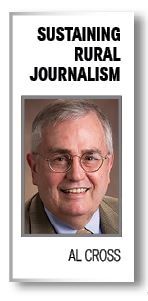A new mission: answering how rural communities sustain journalism that serves local democracy
Al Cross
Jan 1, 2023


The Institute for Rural Journalism and Community Issues has a new mission: to answer the question we posed at our second National Summit on Journalism in Rural America last June: How do rural communities sustain journalism that serves local democracy?
So, this column, which we started almost 12 years ago as a guide to covering rural issues, using examples from The Rural Blog, has a new name: Sustaining Rural Journalism. It will continue to draw from issue stories on the blog, which increasingly focuses on the practice of rural journalism and how it can adapt to the new media landscape.
One encouraging trend in rural journalism is the purchase of quality newspapers by relatively small chains or individuals that appear committed to editorial quality. Recent examples include Steve and Cynthia Haynes’ sale of their northwest Kansas papers to the Mullen brothers of Deer Lodge, Montana; Cherry Road Media’s purchases of several Gannett Co. papers; and Cherry Road’s sale of the Cassville (Missouri) Democrat to Editor Kyle Troutman. The Rural Blog spotlighted them in one of our news-media roundups at https://tinyurl.com/2zvmc2ye. Earlier, at https://tinyurl.com/3y3vy2yt, we noted the Wagner family’s purchase of the Carroll Times Herald and the Jefferson Herald in Iowa.
Another trend in rural newspapers is nonprofit status or purchase by a public benefit corporation, the route taken by the local buyers of two weeklies in northern California. A PBC allows the owners to make a profit while being obliged to operate in the public interest and in a responsible and sustainable manner. We took note of it at https://tinyurl.com/mtcevpaz.
Diversification of your business is another way to sustain your journalism. One of America’s best weeklies, The Pilot of Southern Pines, North Carolina, has community service as its core mission, Editor John Nagy wrote recently. Publisher David Woronoff has diversified into “a family of five magazines across the state, a full-service marketing agency, a telephone directory, a bookstore and a series of digital entities,” such as newsletters. Read our Rural Blog item at https://tinyurl.com/4mx7dbas.
Report for America is trying to help rural newsrooms, and its boss, Steven Waldman, has a good understanding of community news media. At the recent Society of Professional Journalists convention, he said local papers are important not just for accountability reporting, but for "the nature of community itself," creating community identity and helping community members know each other. You and I know that, but it’s nice to hear it from a Columbia University graduate who did most of his journalism in Washington.
Waldman, who also heads the Rebuild Local News Coalition, said the future of local news rests on a three-legged stool: changes in public policy, increases in philanthropic support and improvement of the local news product. He told the audience of student and professional journalists that there has “long been a sense that community journalism is where you cut your teeth” and qualify to move up, but “I've kind of flipped on that. ... Community journalism, given what's going on in our country right now, is almost as important as accountability journalism.”
At the same SPJ session, Cox Newspapers retiree Andy Alexander, who heads a foundation that supports reporting projects in the Rappahannock News of Washington, Virginia, said many people don't realize what narrow margins rural papers have: "You're being published, so you must be all right; it's very close to the line." Alexander said the locally owned weekly and the foundation have more stories than people to do them, so they are training citizens to be reporters.
“There are a lot of people out there who can cover news on the margins,” he said.
Our summary of the SPJ session is at https://tinyurl.com/dx7ryhca.
Newspapers need contributing writers of all kinds, for facts and opinion. I’d like to see more rural papers run pieces by natives who have overcome obstacles and set examples to follow, like this one from an Appalachian scholar who went “from a trailer park in a small town to a two-story house in a subdivision.” The Rural Blog has the whole thing at https://tinyurl.com/324562cy.
Here are some quick takes on issues and topics featured recently on The Rural Blog:
The Federal Communications Commission has new broadband maps that will help determine who will share in the big raft of federal money to expand high-speed internet, but the maps still depend on questionable information from telecommunications companies. They can be challenged, but the deadline is Jan. 13. See https://tinyurl.com/aee86jvc
See lots of unfamiliar names in that list of new teachers at a school board meeting? Might be a good idea to see how well their backgrounds were checked; many misbehaving teachers move from district to district and state to state undiscovered. See https://tinyurl.com/ywreky3r
Is there an effort to ban books in your local libraries? It might have support from outside your community. See https://tinyurl.com/mvu2ct4h
Your rural hospital might choose to avoid closure by becoming a glorified first-aid station. See https://tinyurl.com/3udcayw7
Does your community have a federally qualified health center (generally called “community health center”)? Check to see if federal taxpayers paid settlements or judgments in malpractice lawsuits on its behalf, to whom and how much. https://tinyurl.com/4p6d23w2
Your local governments will be getting money from a national opioid settlement, but it might not come close to making up for the damage done by the drugs.
https://tinyurl.com/3z7rbv57
Will any of your local farmers benefit from the 141 “climate smart” grants that the Department of Agriculture has issued? See https://tinyurl.com/2p8w2j7b
Worried that your local electric substations could become targets of attacks? Here’s background information: https://tinyurl.com/yck9kne8
Every weekday, The Rural Blog is updated with four to six stories on rural issues and rural journalism. Read it at http://irjci.blogspot.com.
Al Cross edited and managed rural newspapers before covering politics for the Louisville Courier Journal and serving as president of the Society of Professional Journalists. He directs the University of Kentucky’s Institute for Rural Journalism and Community Issues, which is seeking a new director as he heads into retirement. For more information, contact him at al.cross@uky.edu.










